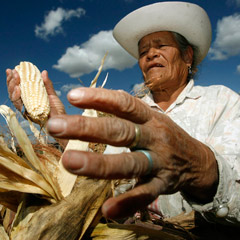 Money that the Catholic agency Chalice used to spend helping kids go to school, helping adults acquire basic literacy, helping communities organize around income-producing projects is now going to feed people who can no longer afford rice and beans.
Money that the Catholic agency Chalice used to spend helping kids go to school, helping adults acquire basic literacy, helping communities organize around income-producing projects is now going to feed people who can no longer afford rice and beans.Commodity food prices, particularly for wheat and rice, have risen to their highest levels since 2008. The World Bank’s food price index shot up 15 per cent between October and January. The bank estimates price increases have driven another 44 million into extreme poverty.
“The impact in the beginning was initially a reduction in the quantity of food being served (at parish-run feeding programs). Now it’s transitioned into a change in diet,” said Suzanne Johnson, Chalice’s international manager for Africa, Haiti and Ukraine. “With rice being so expensive and wheat, they’re now pretty much based on cassava and maize... Our feeding programs are trying to deal with the same amount of money, but the dollar is not buying as much.”
 TORONTO - As the Toronto Catholic District School Board hammers out its equity policy over the next several weeks, with public consultations scheduled for the end of March, some parents and trustees say “stronger language” is needed to ensure that the province’s policy to promote diversity in “gender identity” doesn’t bypass Catholic school’s denominational rights.
TORONTO - As the Toronto Catholic District School Board hammers out its equity policy over the next several weeks, with public consultations scheduled for the end of March, some parents and trustees say “stronger language” is needed to ensure that the province’s policy to promote diversity in “gender identity” doesn’t bypass Catholic school’s denominational rights. But others fear stronger language could have adverse consequences if Catholic school board’s denominational rights are ever the focus of a court challenge.
Last year, school boards began implementing equity and inclusive education policies, with guidelines from the education ministry.
The province introduced its equity and education strategy in 2008 to prohibit discrimination based upon race, religion and sexual orientation. It became law in 2009.

